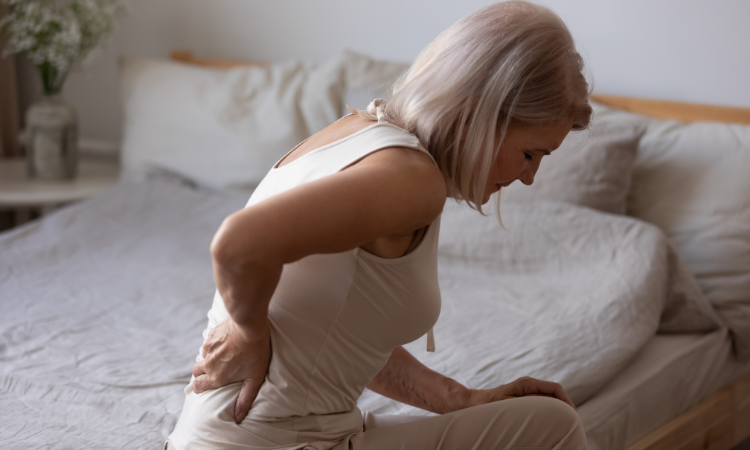Osteoporosis, also known as decreased bone density, is a medical condition that affects the bones, making them fragile and more prone to fractures. This disease usually develops gradually and can go unnoticed for years, until a fracture reveals its presence. In this post by Arandovo, we will explain what osteoporosis is, its symptoms, how to prevent it and some healthy tips to maintain adequate bone density on a daily basis.

What is osteoporosis
Osteoporosis is a bone disease that develops when the body shows a significant loss of bone, produces too little of it, or both. As a result, bones become fragile and prone to fracture with a simple fall or even without an apparent cause. This disorder primarily affects older people, especially postmenopausal women, although it can also affect younger people.
Osteoporosis symptoms
One of the osteoporosis main challenges is that it can go unnoticed due to the lack of obvious symptoms in its early stages. However, as the disease progresses, signs may emerge, such as:
Bone pain
Osteoporosis can cause bone pain, especially in the back, hips, and wrists. This pain may be constant or intermittent and often worsens with movement or physical activity.
Compression fractures
Compression fractures of the spine are a common complication of osteoporosis. These fractures can cause sudden back pain, loss of height and stooped posture.
Hip fractures
People with osteoporosis are at increased risk for hip fractures, especially after a fall. These fractures can cause severe hip pain, difficulty when walking and loss of independence.
Wrist fractures
Wrist fractures are another common complication of osteoporosis, especially in postmenopausal women. These fractures can occur after a fall on the outstretched hand and can cause pain, swelling and difficulty when using the affected hand.
Loss of height
Osteoporosis can cause a gradual decrease in height due to compression fractures in the spine. This loss of height may be gradual and is not always immediately apparent.
It is important to note that you may not experience obvious symptoms in the early stages of osteoporosis. For this reason, regular bone density testing is crucial, especially if you have risk factors such as being a postmenopausal woman or having a family history of osteoporosis, among others.
How to prevent bone density decrease
Good news is that osteoporosis is largely preventable. Adopting healthy lifestyle habits from an early age can strengthen bones and reduce the risk of developing this disease. Here are some tips for preventing decreased bone density:
Balanced and calcium-rich diet
Calcium is essential for bone health. Make sure to include foods such as dairy products, green leafy vegetables, fish and nuts in your diet, which are natural sources of calcium.
Vitamin D
Vitamin D is crucial for calcium absorption in the body. You can get vitamin D through sun exposure and also from foods such as fatty fish, egg yolk and fortified foods.
Regular exercise
Physical exercise, especially weight-bearing exercise such as walking, running, weight lifting or yoga, can strengthen bones and improve bone density. Try to incorporate at least 30 minutes of moderate physical activity on most days of the week.
Maintain a healthy weight
Having a healthy body weight is important for bone health. Both underweight and overweight can increase the risk of osteoporosis. Maintain a healthy equilibrium through a balanced diet and regular exercise.
Avoid falls
Falls can increase the risk of fractures, especially in people with osteoporosis. Take steps to reduce the risk of falls, such as keeping your home safe, wearing appropriate footwear, using assistive devices if necessary, and practicing balance and strength exercises.
Proper posture
Maintaining proper posture can help prevent the loss of height and spinal curvature associated with osteoporosis. Work on strengthening the muscles of the back and abdomen to maintain an upright posture.
Regular medical appointments
Regular bone densitometry testing can help detect osteoporosis in its early stages and take preventive or treatment measures as needed.
Natural food supplements to fight osteoporosis
In addition to obtaining calcium and vitamin D through diet, some people may take natural food supplements to maintain perfect bone health. Some of these supplements include:
- Calcium supplements
If you cannot get enough calcium from food, calcium supplements may be an option. However, it is important not to exceed the recommended dosage, as too much calcium can also be harmful.
- Vitamin D supplements
If you are deficient in vitamin D, your doctor may recommend supplements to correct it. As with calcium, it is important to follow medical advice to avoid excessive intake.
- Magnesium and Vitamin K supplements
These nutrients are also important for bone health and may be included in some supplements specifically formulated for osteoporosis.
MKARE, your natural ally for better bones
MKARE®️ is a 100% natural functional ingredient based on eggshell membrane that will help you improve your bones thanks to its incredible properties. Arandovo’s MKARE®️ is a supplement rich in collagen (type I, V and X), hyaluronic acid, elastin, sulfate, glucosamine, chondroitin and over 400 vitamins, which make it one of the most complete natural supplements to improve bone health.
With the intake of MKARE®️ you will not only get healthy bones but it also helps to reduce inflammation, improving mobility and reducing joint and bone pain. Visit
our website now to learn how our ingredient can be your best ally to improve your bone health.
Osteoporosis is a common but preventable bone disease. Adopting a healthy lifestyle that includes a balanced diet and regular exercise can help maintain bone health throughout life. In addition, taking natural food supplements such as MKARE®️ can significantly help maintain healthy and strong bones.
It is important to keep in mind that you may not experience obvious symptoms in the early stages of osteoporosis. For this reason, regular bone density testing is crucial, especially if you have risk factors such as being a postmenopausal woman, having a family history of osteoporosis, or leading a sedentary lifestyle. If you experience any of these symptoms or have concerns about your bone health, it is important to consult a doctor for proper evaluation and treatment.




